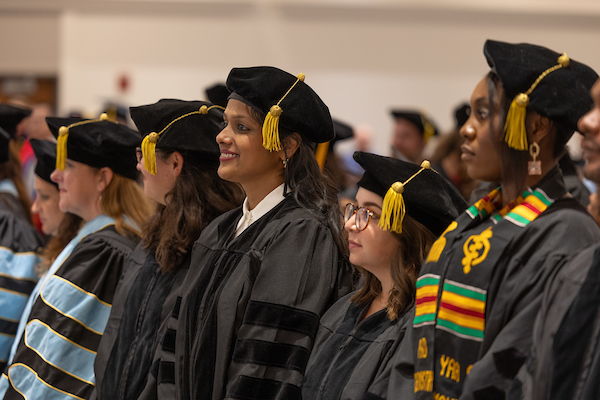
Exploring Best Practices in Preparing Doctoral Students for Success
Eligibility
Faculty and Staff
- Preference will be given to faculty from doctoral-granting departments.
- Experience mentoring doctoral students (e.g., advisor, cross-cultural mentor, committee members, etc.)
Graduate Students
- Graduate students from doctoral programs who have completed at least one year of graduate training.
Amount
Each participant will receive $500 in professional development funds.
Meeting Dates and Times
This FLC will meet every 3 weeks for 2 hours (10:00 a.m. - 12:00 p.m.) on the following dates.
Fall Semester: September 9, September 30, October 21, November 11. December 2
Spring Semester: January 27, February 17, March 10, March 31, April 21
Submission
Deadline
April 26, 2024
Purpose and Description
In today's rapidly evolving academic and professional landscape, doctoral programs face the dual challenge of preparing some of their students for careers in academia while equipping other students to thrive in industry settings (St. Clair, Hutto, MacBeth, Newstetter, McCarty, & Melkers, 2017). Most doctoral programs across the US, including those at Miami, follow a training model of researcher apprenticeship where students are trained to become tenure-track faculty members (Sinche et al., 2017). The perpetuation of this model makes sense as those who are faculty in doctoral programs continue to replicate their own preparation as they train their students. A result of this approach to training was the development of the Preparing Future Faculty (PFF) program in 1993. PFF aimed to ensure quality preparation of doctoral students for careers in academia. Since its inception, many graduate schools have adopted the program even though the initial funding that launched the program has dried up (Preparing Future Faculty, n.d.). The reality is that doctoral programs are producing more PhDs than there are viable positions in higher education (St. Clair et al., 2017). Thus, we should not be surprised that there are doctoral students whose interests shift from higher education to industry (Sauermann & Roach, 2012). This is reflected in Miami’s 2022 Survey of Earned Doctorates where 41.2% of recent doctoral student graduates were planning on employment outside of academia (National Center for Science and Engineering Statistics, 2023). Rather than considering the transition to careers in industry a failure on the student’s part, doctoral programs should embrace this change and work to adapt to ensure student success (Seo & Yeo, 2020).
To address this critical need, this Faculty Learning Community (FLC) will focus on bridging academia and industry to better prepare doctoral students for success in both domains.
References
National Center for Science and Engineering Statistics (2023). Survey of Earned Doctorates (available upon request).
Preparing Future Faculty (n.d.). The Preparing Future Faculty Program https://preparing-faculty.org/
St. Clair, R., Hutto, T., MacBeth, C., Newstetter, W., McCarty, N. A., & Melkers, J. (2017). The “new normal”: Adapting doctoral trainee career preparation for broad career paths in science. PloS one, 12(5), e0177035. https://doi.org/10.1371/journal.pone.0181294
Sauermann, H., & Roach, M. (2012). Science PhD career preferences: Levels, changes and advisor encouragement. PLoS ONE, 7(5), e36307. https://doi.org/10.1371/journal.pone.0036307
Seo, G., & Yeo, H. T. (2020). In pursuit of careers in the professoriate or beyond the professoriate: what matters to doctoral students when making a career choice?. International Journal of Doctoral Studies, 15, 615.
Sinche, M., Layton, R. L., Brandt, P. D., O’Connell, A. B., Hall, J. D., Freeman, A. M., Harrell, J. R., Cook, J. G., & Brennwald, P. J. (2017). An evidence-based evaluation of transferrable skills and job satisfaction for science PhDs. PLoS ONE, 12(9), e0185023. https://doi.org/10.1371/journal.pone.0185023
Activities
Members will:
- Engage in discussions among faculty/staff members and doctoral students from diverse disciplines to explore best practices, resources, and strategies for preparing doctoral students for careers in academia and industry.
- Explore effective methods for integrating real-world industry experiences and skill development into doctoral programs without compromising academic rigor.
- Begin to identify and develop mentorship and networking opportunities for doctoral students with professionals in academia and industry.
- Identify measures of effectiveness for doctoral outcomes that include both academic and non-academic paths.
- Participate in information-seeking sessions and field trips to other nearby universities to learn of their best practices.
Members
2024-2025
- Abisola Adegunju, Educational Leadership, Member
- Abubakar Bala, Educational Leadership, Member
- Troylin Banks, College of Education, Health, & Society, Member
- Erica Campbell, Educational Leadership, Member
- Danielle Hart, Center for Career Exploration & Success, Member
- Leah Janssen, Scripps Gerontology Center, Member
- Roshan Lama, Chemistry & Biochemistry, Member
- Rock Mancini, Chemistry & Biochemistry, Member
- Claire McLeod, Geology & Environmental Earth Science, Member
- Elise Radina, Graduate School, Co-Facilitator
- Erika Rosenberger, Psychology, Member
- Peter Wessels, Psychology, Co-Facilitator
